Cioran
Cô bạn, cô phù dâu ngày nào, Gấu gặp lại ở hải ngoại. Cô phán, cực kỳ bi thương, cực kỳ hạnh phúc, tại làm sao mà bao nhiêu năm trời, tình cảm của anh dành cho tôi vẫn như ngày nào.
Nhờ gặp lại cô, Gấu viết lại được, không chỉ thế, mà còn làm được tí thơ!
Bài viết về cô, Cầm Dương Xanh, được một vị nữ độc giả, Bắc Kít, Hà Lội, mê quá, bệ ngay về trang FB của cô.
Cô tình cờ thấy trang TV, trong khi lướt net, tìm tài liệu về Camus.
Có lẽ đã đến lúc cần nghiêm túc nghĩ đến việc mở một chuyên đề đích thực về Cioran :p
Blog NL
Mới lật ra đi 1 đường loáng thoáng, vớ được câu này thật tuyệt:
Con người, bị đá văng ra khỏi Thiên Đàng, với 1 tí tưởng tượng, đủ cho nó cảm thấy đời mình sao rất đỗi bi thương!
Ui chao, hồi còn trẻ, bị em bỏ, bị cuộc chiến hành, không làm sao dám bỏ chạy, đúng là tâm trạng Gấu khi đó.
Những ngày Mậu Thân căng thẳng, Đại Học đóng cửa, cô bạn về quê, nỗi nhớ bám riết vào da thịt thay cho cơn bàng hoàng khi cận kề cái chết theo từng cơn hấp hối của thành phố cùng với tiếng hỏa tiễn réo ngang đầu. Trong những giờ phút lặng câm nhìn bóng mình run rẩy cùng với những thảm bom B52 rải chung quanh thành phố, trong lúc cảm thấy còn sống sót, vẫn thường tự hỏi, phải yêu thương cô bạn một cách bình thường, giản dị như thế nào cho cân xứng với cuộc sống thảm thương như vậy...
Bạn đọc TV để ý, không có chấm câu. Câu văn dài thòng, như bè rau ruống!
Cô bạn, cô phù dâu ngày nào, Gấu gặp lại ở hải ngoại. Cô phán, cực kỳ bi thương, cực kỳ hạnh phúc, tại làm sao mà bao nhiêu năm trời, tình cảm của anh dành cho tôi vẫn như ngày nào.
Nhờ gặp lại cô, Gấu viết lại được, không chỉ thế, mà còn làm được tí thơ!
Bài viết về cô, Cầm Dương Xanh, được một vị nữ độc giả, Bắc Kít, Hà Lội, mê quá, bệ ngay về trang FB của cô.
Cô tình cờ thấy trang TV, trong khi lướt net, tìm tài liệu về Camus.
Cầm Dương Xanh
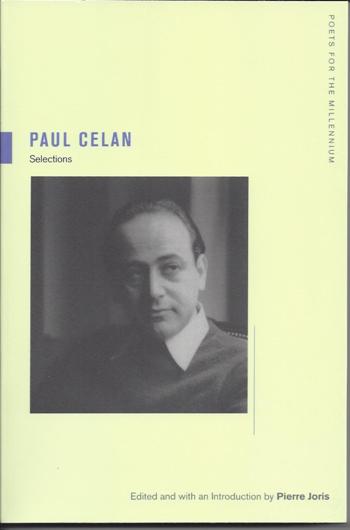
ENCOUNTERS
WITH PAUL CELAN
E. M. CIORAN
Précis de decomposition, my first book written in
French,
was published in I949 by Gallimard. Five works of mine had been
published in
Romanian. In 1937, I arrived in Paris on a scholarship from the
Bucharest
Institut francais, and I have never left. It was only in I947, though,
that I
thought of giving up my native language. It was a sudden decision.
Switching
languages at the age of thirty-seven is not an easy undertaking. In
truth, it
is a martyrdom, but a fruitful martyrdom, an adventure that lends
meaning to
being (for which it has great need!). I recommend to anyone going
through a
major depression to take on the conquest of a foreign idiom, to
reenergize
himself, altogether to renew himself, through the Word. Without my
drive to conquer
French, I might have committed suicide. A language is a continent, a
universe,
and the one who makes it his is a conquistador. But let us get to the
subject.
...
The German translation of the Précis proved difficult. Rowohlt, the publisher, had engaged an unqualified woman, with disastrous resuits. Someone else had to be found. A Romanian writer, Virgil Ierunca, who, after the war, had edited a literary journal in Romania, in which Celan's first poems were published, warmly recommended him. Celan, whom I knew only by name, lived in the Latin quarter, as did 1. Accepting my offer, Celan set to work and managed it with stunning speed. I saw him often, and it was his wish that I read closely along, chapter by chapter, as he progressed, offering possible suggestions. The vertiginous problems involved in translation were at that time foreign to me, and I was far from assessing the breadth of it. Even the idea that one might have a committed interest in it seemed rather extravagant to me. I was to experience a complete reversal, and, years later, would come to regard translation as an exceptional undertaking, as an accomplishment almost equal to that of the work of creation. I am sure, now, that the only one to understand a book thoroughly is someone who has gone to the trouble of translating it. As a general rule, a good translator sees more clearly than the author, who, to the extent that he is in the grips of his work, cannot know its secrets, thus its weaknesses and its limits. Perhaps Celan, for whom words were life and death, would have shared this position on the art of translation.
In 1978, when Klett was reprinting Lehre vom Zerfall (the German Précis), I was asked to correct any errors that might exist. I was unable to do it myself, and refused to engage anyone else. One does not correct Celan. A few months before he died, he said to me that he would like to review the complete text. Undoubtedly, he would have made numerous revisions, since, we must remember, the translation of the Précis dates back to the beginning of his career as a translator. It is really a wonder that a noninitiate in philosophy dealt so extraordinarily well with the problems inherent in an excessive, even provocative, use of paradox that characterizes my book.
Relations with this deeply torn being were not simple. He clung to his biases against one person or another, he sustained his mistrust, all the more so because of his pathological fear of being hurt, and everything hurt him. The slightest indelicacy, even unintentional, affected him irrevocably. Watchful, defensive against what might happen, he expected the same attention from others, and abhorred the easygoing attitude so prevalent among the Parisians, writers or not. One day, I ran into him in the street. He was in a rage, in a state nearing despair, because X, whom he had invited to have dinner with him, had not bothered to come. Take it easy, I said to him, X is like that, he is known for his don't-give-a-damn attitude. The only mistake was expecting him. Celan, at that time, was living very simply and having no luck at all finding a decent job. You can hardly picture him in an office. Because of his morbidly sensitive nature, he nearly lost his one opportunity.
The very day that I was going to his home to lunch with him, I found out that there was a position open for a German instructor at the Ecole normale supérieure, and that the appointment of a teacher would be imminent. I tried to persuade Celan that it was of the utmost importance for him to appeal vigorously to the German specialist in whose hands the matter resided. He answered that he would not do anything about it, that the professor in question gave him the cold shoulder, and that he would for no price leave himself open to rejection, which, according to him, was certain. Insistence seemed useless.
Returning home, it occurred to me to send him by pneumatique, a message in which I pointed out to him the folly of allowing such an opportunity to slip away. Finally he called the professor, and the matter was settled in a few minutes. "I was wrong about him," he told me later. I won't go so far as to propose that he saw a potential enemy in every man; however, what was certain was that he lived in fear of disappointment or outright betrayal. His inability to be detached or cynical made his life a nightmare. I will never forget the evening I spent with him when the widow of a poet had, out of literary jealousy, launched an unspeakably vile campaign against him in France and Germany, accusing him of having plagiarized her husband. "There isn't anyone in the world more miserable than I am," Celan kept saying. Pride doesn't soothe fury, even less despair.
Something within him must have been broken very early on, even before the misfortunes which crashed down upon his people and himself. I recall a summer afternoon spent at his wife's lovely country place, about forty miles from Paris. It was a magnificent day.
Everything invoked relaxation, bliss, illusion. Celan, in a lounge chair, tried unsuccessfully to be lighthearted. He seemed awkward, as if he didn't belong, as though that brilliance was not for him. What can I be looking for here? he must have been thinking. And, in fact, what was he seeking in the innocence of that garden, this man who was guilty of being unhappy, and condemned not to find his place anywhere? It would be wrong to say that I felt truly ill at ease; nevertheless, the fact was that everything about my host, including his smile, was tinged with a pained charm, and something like a sense of nonfuture.
Is it a privilege or a curse to be marked by misfortune? Both at once. This double face defines tragedy. So Celan was a figure, a tragic being. And for that he is for us somewhat more than a poet .
The German translation of the Précis proved difficult. Rowohlt, the publisher, had engaged an unqualified woman, with disastrous resuits. Someone else had to be found. A Romanian writer, Virgil Ierunca, who, after the war, had edited a literary journal in Romania, in which Celan's first poems were published, warmly recommended him. Celan, whom I knew only by name, lived in the Latin quarter, as did 1. Accepting my offer, Celan set to work and managed it with stunning speed. I saw him often, and it was his wish that I read closely along, chapter by chapter, as he progressed, offering possible suggestions. The vertiginous problems involved in translation were at that time foreign to me, and I was far from assessing the breadth of it. Even the idea that one might have a committed interest in it seemed rather extravagant to me. I was to experience a complete reversal, and, years later, would come to regard translation as an exceptional undertaking, as an accomplishment almost equal to that of the work of creation. I am sure, now, that the only one to understand a book thoroughly is someone who has gone to the trouble of translating it. As a general rule, a good translator sees more clearly than the author, who, to the extent that he is in the grips of his work, cannot know its secrets, thus its weaknesses and its limits. Perhaps Celan, for whom words were life and death, would have shared this position on the art of translation.
In 1978, when Klett was reprinting Lehre vom Zerfall (the German Précis), I was asked to correct any errors that might exist. I was unable to do it myself, and refused to engage anyone else. One does not correct Celan. A few months before he died, he said to me that he would like to review the complete text. Undoubtedly, he would have made numerous revisions, since, we must remember, the translation of the Précis dates back to the beginning of his career as a translator. It is really a wonder that a noninitiate in philosophy dealt so extraordinarily well with the problems inherent in an excessive, even provocative, use of paradox that characterizes my book.
Relations with this deeply torn being were not simple. He clung to his biases against one person or another, he sustained his mistrust, all the more so because of his pathological fear of being hurt, and everything hurt him. The slightest indelicacy, even unintentional, affected him irrevocably. Watchful, defensive against what might happen, he expected the same attention from others, and abhorred the easygoing attitude so prevalent among the Parisians, writers or not. One day, I ran into him in the street. He was in a rage, in a state nearing despair, because X, whom he had invited to have dinner with him, had not bothered to come. Take it easy, I said to him, X is like that, he is known for his don't-give-a-damn attitude. The only mistake was expecting him. Celan, at that time, was living very simply and having no luck at all finding a decent job. You can hardly picture him in an office. Because of his morbidly sensitive nature, he nearly lost his one opportunity.
The very day that I was going to his home to lunch with him, I found out that there was a position open for a German instructor at the Ecole normale supérieure, and that the appointment of a teacher would be imminent. I tried to persuade Celan that it was of the utmost importance for him to appeal vigorously to the German specialist in whose hands the matter resided. He answered that he would not do anything about it, that the professor in question gave him the cold shoulder, and that he would for no price leave himself open to rejection, which, according to him, was certain. Insistence seemed useless.
Returning home, it occurred to me to send him by pneumatique, a message in which I pointed out to him the folly of allowing such an opportunity to slip away. Finally he called the professor, and the matter was settled in a few minutes. "I was wrong about him," he told me later. I won't go so far as to propose that he saw a potential enemy in every man; however, what was certain was that he lived in fear of disappointment or outright betrayal. His inability to be detached or cynical made his life a nightmare. I will never forget the evening I spent with him when the widow of a poet had, out of literary jealousy, launched an unspeakably vile campaign against him in France and Germany, accusing him of having plagiarized her husband. "There isn't anyone in the world more miserable than I am," Celan kept saying. Pride doesn't soothe fury, even less despair.
Something within him must have been broken very early on, even before the misfortunes which crashed down upon his people and himself. I recall a summer afternoon spent at his wife's lovely country place, about forty miles from Paris. It was a magnificent day.
Everything invoked relaxation, bliss, illusion. Celan, in a lounge chair, tried unsuccessfully to be lighthearted. He seemed awkward, as if he didn't belong, as though that brilliance was not for him. What can I be looking for here? he must have been thinking. And, in fact, what was he seeking in the innocence of that garden, this man who was guilty of being unhappy, and condemned not to find his place anywhere? It would be wrong to say that I felt truly ill at ease; nevertheless, the fact was that everything about my host, including his smile, was tinged with a pained charm, and something like a sense of nonfuture.
Is it a privilege or a curse to be marked by misfortune? Both at once. This double face defines tragedy. So Celan was a figure, a tragic being. And for that he is for us somewhat more than a poet .
E. M. Cioran, "Encounters
with
Paul Celan," in Translating Tradition: Paul Celan in France, edited by
Benjamin Hollander (San Francisco: ACTS 8/9,1988): 151-52.
Is it a
privilege or a curse to be marked by misfortune? Both at once. This
double face
defines tragedy. So Celan was a figure, a tragic being. And for that he
is for
us somewhat more than a poet .
Đặc quyền,
hay trù ẻo, khi nhận "ân sủng" của sự bất hạnh?
Liền tù tì cả hai!
Cái bộ mặt kép đó định nghĩa thế nào là bi kịch.
Và như thế, Celan là 1 hình tượng, một con người bi thương.
Và như thế, ông bảnh hơn nhiều, chứ không "chỉ là 1 nhà thơ"!
Liền tù tì cả hai!
Cái bộ mặt kép đó định nghĩa thế nào là bi kịch.
Và như thế, Celan là 1 hình tượng, một con người bi thương.
Và như thế, ông bảnh hơn nhiều, chứ không "chỉ là 1 nhà thơ"!
Triết Gia Của Sự Mất Ngủ
Trên tờ Books, có bài về
Philo, thú: Bằng cách nào Emil trở thành Cioran.
Khi ông ta viết, "tuổi trẻ, ở đâu cũng thế, và luôn luôn là như vậy, thần tượng hóa, lý tưởng hoá, những tên đao phủ thủ”, ông nói về ông.
Cioran, là Thầy của CVD. GCC đoán thế, hình như anh có thừa nhận điều này?
Và sau này, nếu CVD…sống sót, như… Murakami, thì có lẽ sẽ có 1 bài viết, “Bằng cách nào đao phủ thủ trở thành... dê tế thần”!
Khi ông ta viết, "tuổi trẻ, ở đâu cũng thế, và luôn luôn là như vậy, thần tượng hóa, lý tưởng hoá, những tên đao phủ thủ”, ông nói về ông.
Cioran, là Thầy của CVD. GCC đoán thế, hình như anh có thừa nhận điều này?
Và sau này, nếu CVD…sống sót, như… Murakami, thì có lẽ sẽ có 1 bài viết, “Bằng cách nào đao phủ thủ trở thành... dê tế thần”!
Hà, hà!
CVD lúc mới xuất hiện, cũng
trảm nhiều tác giả lắm, [trong số đó, có HH!]
Cioran là Thầy của NTV, cái này thì chắc chắn. Anh cũng chẳng thèm chối, và còn rất ư tự hào!
Cioran là Thầy của NTV, cái này thì chắc chắn. Anh cũng chẳng thèm chối, và còn rất ư tự hào!
Nhưng theo GCC, NTV thua
thầy xa.
Thầy chán đời, mà để lại hằng hà tác phẩm.
Còn NTV, một con số không to tổ bố.
Thầy chán đời, mà để lại hằng hà tác phẩm.
Còn NTV, một con số không to tổ bố.
Nhớ, có lần ngồi đấu bia,
và tán láo, nghe GCC nhắc tới kỷ niệm về ông anh nhà thơ, và lời khuyên
của
ông, phải dịch, dịch, dịch, dịch tưới, đừng sợ sai, sai tới đâu sửa tới
đó,
không là không thể nào có tác phẩm… Anh buồn rầu than, giá mà hồi trẻ,
tao gặp
TTT, thì cũng đã có vô số tác phẩm rồi. Hồi đó, ngu quá, cứ sợ dịch sai!
Nhưng NTV cũng có chút an ủi. Khi anh dịch Cao Hành Kiện, TTT đọc, thú quá, phôn, khen, đúng giọng văn của tác giả Thằng Kình, tức Nguyễn Đức Quỳnh.
NDQ cũng là Thầy của NTV. Anh có nhiều kỷ niệm về NDQ, giá mà viết ra thì cũng thú lắm. Thí dụ cái câu phán nổi tiếng của NDQ là GCC nghe qua NTV:
Quốc Gia thì như bát cơm hẩm, trộn cứt, VC thì như bát cơm gạo tám thơm, trộn thuốc độc.
Tuyệt cú!
Nhưng NTV cũng có chút an ủi. Khi anh dịch Cao Hành Kiện, TTT đọc, thú quá, phôn, khen, đúng giọng văn của tác giả Thằng Kình, tức Nguyễn Đức Quỳnh.
NDQ cũng là Thầy của NTV. Anh có nhiều kỷ niệm về NDQ, giá mà viết ra thì cũng thú lắm. Thí dụ cái câu phán nổi tiếng của NDQ là GCC nghe qua NTV:
Quốc Gia thì như bát cơm hẩm, trộn cứt, VC thì như bát cơm gạo tám thơm, trộn thuốc độc.
Tuyệt cú!
Tuổi trẻ, ở đâu cũng thế,
và luôn luôn là như vậy, thần tượng hóa, lý tưởng hoá, những tên đao
phủ thủ.
Thảo nào tuổi trẻ Mít mê như điên Hoàng Phủ Ngọc Tường, chọn quốc ca là thơ của “hit man” VC.
Thảo nào tuổi trẻ Mít mê như điên Hoàng Phủ Ngọc Tường, chọn quốc ca là thơ của “hit man” VC.
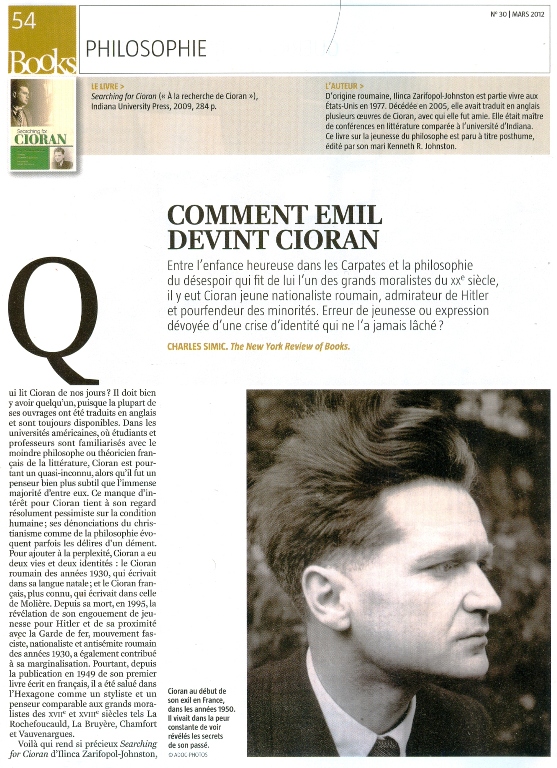
Không biết
CVD ngoài đời có đẹp giai như sư phụ? Tính về thăm hoài, và, nếu có
thể, xin...
phò, nhưng sợ VC đá đít như Thầy Kuốc.
Thăm “Sách Huyền” nữa chứ.
Nhớ Hà Nội quá!
Hà, hà!
Thăm “Sách Huyền” nữa chứ.
Nhớ Hà Nội quá!
Hà, hà!
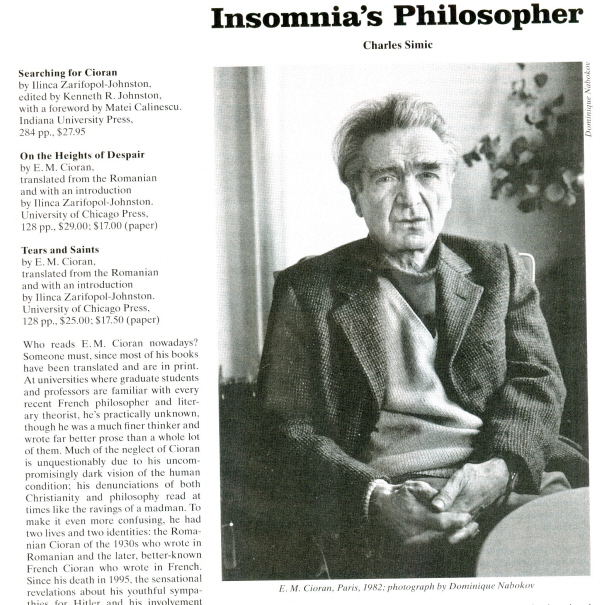

Không biết
CVD ngoài đời có đẹp giai như sư phụ? Tính về thăm hoài, và, nếu có
thể, xin...
phò, nhưng sợ VC đá đít như Thầy Kuốc.
Thăm “Sách Huyền” nữa chứ.
Nhớ Hà Nội quá!
Hà, hà!
Thăm “Sách Huyền” nữa chứ.
Nhớ Hà Nội quá!
Hà, hà!
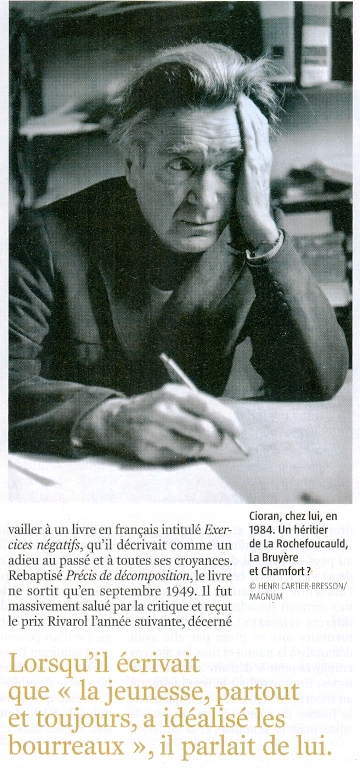
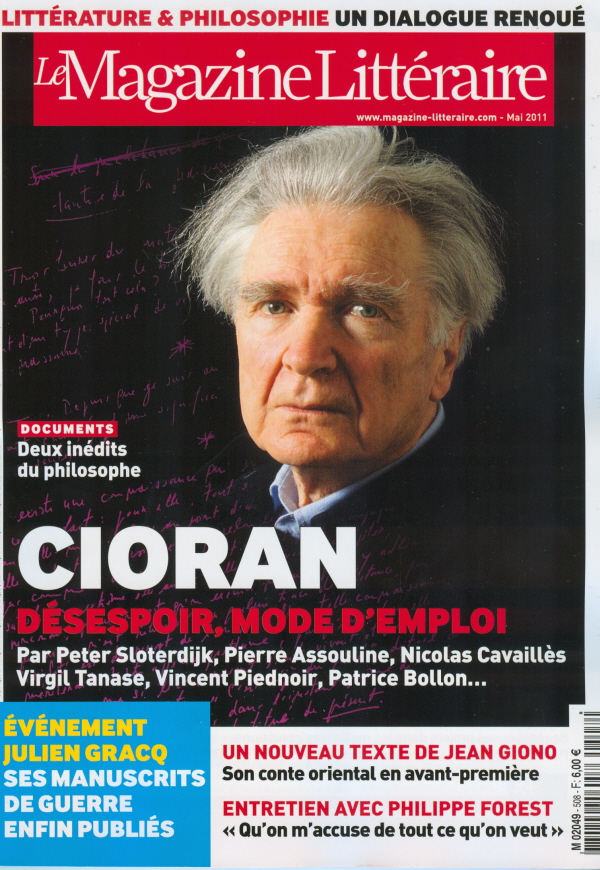
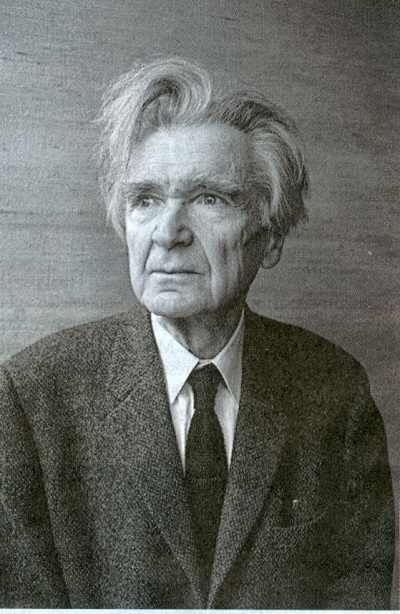
Who reads
E.M. Cioran nowadays? Someone must, since most of his books have been
translated and are in print. At universities where graduate students
and
professors are familiar with every recent French philosopher and
literary
theorist, he’s practically unknown, though he was a much finer thinker
and
wrote far better prose than a whole lot of them. Much of the neglect of
Cioran
is unquestionably due to his uncompromisingly dark vision of the human
condition;
his denunciations of both Christianity and philosophy read at times
like the
ravings of a madman. To make it even more confusing, he had two lives
and two
identities: the Romanian Cioran of the 1930s who wrote in Romanian and
the
later, better-known French Cioran who wrote in French. Since his death
in 1995,
the sensational revelations about his youthful sympathies for Hitler
and his
involvement with the Iron Guard, the Romanian pro-fascist, nationalist,
and
anti-Semitic movement in the 1930s, have also contributed to his
marginalization. And yet following the publication in 1949 of the first
book he
wrote in French, he was hailed in France as a stylist and thinker
worthy of
comparison to great seventeenth- and eighteenth-century moralists like
La
Rochefoucauld, La Bruyère, Chamfort, and Vauvenargues.
This is what
makes Searching for Cioran by
the late Ilinca Zarifopol-Johnston, who didn’t
live to finish her book, so valuable. It tells the story of his
Romanian years
and gives a fine account of the personal and political circumstances in
which
both his philosophical ideas and his brand of nationalism were formed.
In later
years, Cioran spoke rarely of that shameful period in his life and
never—except
to allude vaguely to his “youthful follies”—talked openly of his one
political
tract, Romania’s Transfiguration (1936), a short, demented book in
which he
prescribed how his native country could overcome its second-rate
historical
status through radical, totalitarian methods. Along with Mircea Eliade,
the
philosopher and historian of religion, the playwright Eugène Ionesco,
and many
others, equally eminent but less known abroad, he was a member of
Romania’s
“Young Generation,” the “angry young men” responsible for both a
cultural
renaissance and apocalyptic nationalism in the 1930s. To understand
what led
Cioran to leave Romania and become disillusioned with ideas he espoused
in his
youth, it’s best to start at the beginning.
Emil Cioran
was born in 1911, the second of three children, in the remote mountain
village
of Ra˘s¸inari near the city of Sibiu in southern Transylvania, which at
that
time was still part of the Austro-Hungarian Empire. His father,
Emilian, was a
Romanian Orthodox priest who came from a long line of priests, as did
his
mother, Elvira. He loved his native landscape with its streams, hills,
and
woods where he ran free with other kids, even telling one interviewer,
“I don’t
know of anyone with a happier childhood than mine.”
At other
times, when not moved by nostalgia, he called …
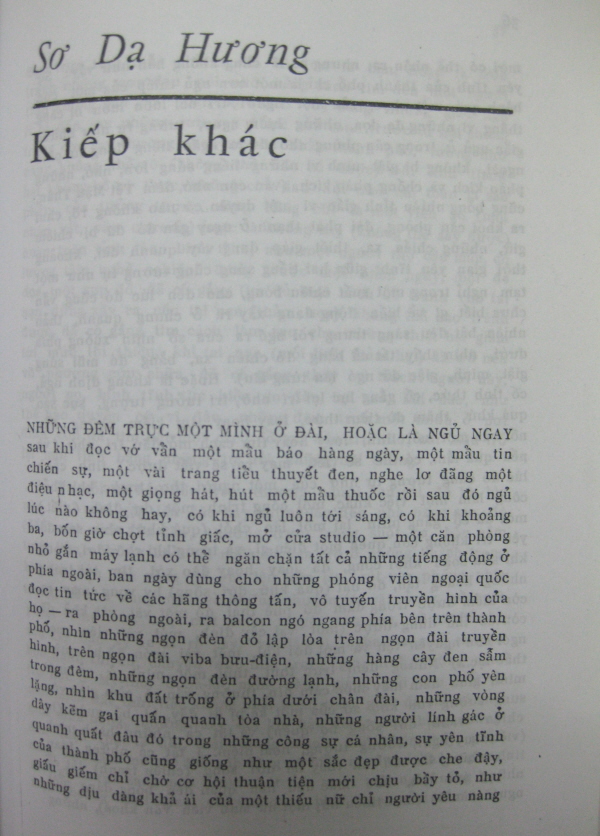

Comments
Post a Comment